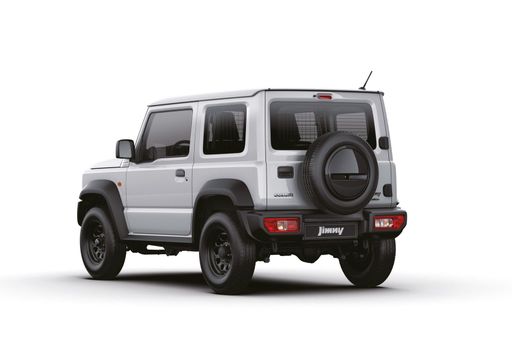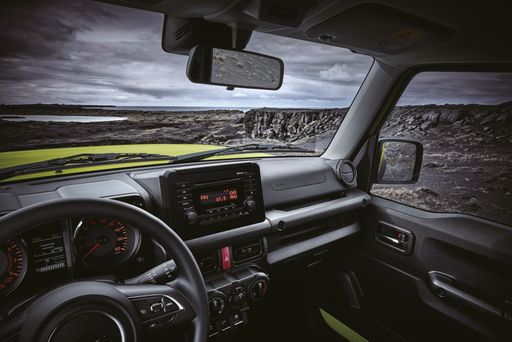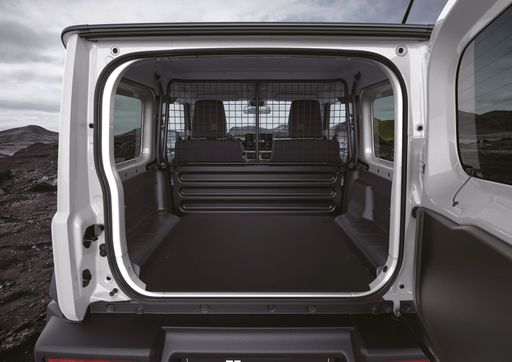Suzuki Jimny vs Toyota Proace Max – Differences & prices compared
Compare performance, boot space, consumption and price in one view.
Find out now: which car is the better choice for you – Suzuki Jimny or Toyota Proace Max?
The Suzuki Jimny (Off-Roader) comes with a Petrol engine and Manuel transmission. In comparison, the Toyota Proace Max (Cargo Van) features a Diesel or Electric engine with Manuel or Automatic transmission.
When it comes to boot capacity, the Suzuki Jimny offers , while the Toyota Proace Max provides – depending on how much space you need. If you’re looking for more power, decide whether the 102 HP of the Suzuki Jimny or the 279 HP of the Toyota Proace Max suits your needs better.
In terms of consumption, the values are 7.70 L per 100 km for the Suzuki Jimny, and 26.20 kWh7.80 L for the Toyota Proace Max.
Price-wise, the Suzuki Jimny starts at 25300 £, while the Toyota Proace Max is available from 35500 £. Compare all the details and find out which model fits your lifestyle best!
Suzuki Jimny
The Suzuki Jimny is a compact SUV that has gained a loyal following for its rugged charm and off-road capabilities. Its boxy design is both nostalgic and functional, making it stand out in a sea of more streamlined vehicles. Despite its small size, the Jimny offers a surprisingly robust driving experience, ideal for adventurous journeys off the beaten track.
details @ suzuki.at
@ suzuki.at
 @ suzuki.at
@ suzuki.at
 @ suzuki.at
@ suzuki.at
 @ suzuki.at
@ suzuki.at
Toyota Proace Max
The Toyota Proace Max is a versatile vehicle that seamlessly combines functionality with style. Its spacious interior is designed to accommodate both passengers and cargo comfortably, making it an ideal choice for families and businesses alike. With a sleek exterior and a range of advanced features, the Proace Max stands out in its class, offering a reliable and efficient driving experience.
details

|
|
|
|
|
Costs and Consumption |
|
|---|---|
|
Price
25300 - 27700 £
|
Price
35500 - 61000 £
|
|
Consumption L/100km
7.70 L
|
Consumption L/100km
7.8 - 8.7 L
|
|
Consumption kWh/100km
-
|
Consumption kWh/100km
26.20 kWh
|
|
Electric Range
-
|
Electric Range
424 km
|
|
Battery Capacity
-
|
Battery Capacity
-
|
|
co2
173 g/km
|
co2
0 - 229 g/km
|
|
Fuel tank capacity
40 L
|
Fuel tank capacity
90 L
|
Dimensions and Body |
|
|---|---|
|
Body Type
Off-Roader
|
Body Type
Cargo Van
|
|
Seats
2
|
Seats
3 - 7
|
|
Doors
3
|
Doors
4 - 5
|
|
Curb weight
1165 kg
|
Curb weight
2075 - 2790 kg
|
|
Trunk capacity
-
|
Trunk capacity
-
|
|
Length
3645 mm
|
Length
5413 - 6363 mm
|
|
Width
1645 mm
|
Width
2050 mm
|
|
Height
1705 mm
|
Height
2254 - 2774 mm
|
|
Payload
270 kg
|
Payload
710 - 1460 kg
|
Engine and Performance |
|
|---|---|
|
Engine Type
Petrol
|
Engine Type
Diesel, Electric
|
|
Transmission
Manuel
|
Transmission
Manuel, Automatic
|
|
Transmission Detail
Manual Gearbox
|
Transmission Detail
Manual Gearbox, Automatic Gearbox, Reduction Gearbox
|
|
Drive Type
All-Wheel Drive
|
Drive Type
Front-Wheel Drive
|
|
Power HP
102 HP
|
Power HP
120 - 279 HP
|
|
Acceleration 0-100km/h
12.80 s
|
Acceleration 0-100km/h
-
|
|
Max Speed
145 km/h
|
Max Speed
130 - 161 km/h
|
|
Torque
130 Nm
|
Torque
320 - 450 Nm
|
|
Number of Cylinders
4
|
Number of Cylinders
4
|
|
Power kW
75 kW
|
Power kW
88 - 205 kW
|
|
Engine capacity
1462 cm3
|
Engine capacity
2184 cm3
|
General |
|
|---|---|
|
Model Year
2021 - 2024
|
Model Year
2024 - 2025
|
|
CO2 Efficiency Class
F
|
CO2 Efficiency Class
G, A
|
|
Brand
Suzuki
|
Brand
Toyota
|
Suzuki Jimny
Revamping Tradition with Modern Twists: The Suzuki Jimny
The Suzuki Jimny continues its legacy as a robust compact off-roader, seamlessly blending its iconic design with modern technological advancements. Whether traversing rugged terrains or cruising urban streets, the Jimny stands out as a versatile companion.
A Legacy Reimagined: Design and Build
Suzuki stays true to its roots with the Jimny's classic square silhouette. This three-door compact SUV is not just about aesthetics; its dimensions—with a length of 3645 mm, a width of 1645 mm, and a height of 1705 mm—are designed to tackle off-road challenges effortlessly. With its compact build, the Jimny fits snugly into city parking spots whilst still radiating an aura of toughness.
The Heart of the Machine: Engine and Performance
Powered by a 1.5-litre four-cylinder engine, the Jimny delivers 102 PS and 130 Nm of torque. Its petrol engine is paired with a manual transmission, offering drivers a more connected and tactile driving experience. With a fuel consumption of 7.7 L/100km, it strives to balance power and efficiency. The Jimny's maximum speed peaks at 145 km/h, while it accelerates from 0 to 100 km/h in 12.8 seconds, a testament to its steadfast performance in its category.
Mastering Terrains with ALLGRIP PRO
One of the standout features of the Jimny is its ALLGRIP PRO all-wheel-drive system, designed for serious off-roaders. This technology provides the driver with the ability to switch between 2WD and 4WD at the flick of a switch, ensuring maximum traction no matter the condition. The elevation of its chassis and its tough underbody protection mean the Jimny can handle rough landscapes with relative ease.
Comfort Meets Functionality: Interior Features
Step inside, and you'll find an interior that perfectly balances utility and comfort. The Jimny might be a two-seater, but its thoughtful design ensures ample space for both driver and passenger. The dashboard is simple yet functional, equipped with essential features that accentuate the driving experience without unnecessary distractions.
The Green Concerns: Environmental Impact
While the Jimny offers impressive off-road capabilities, its CO2 emissions stand at 173 g/km, placing it within efficiency class F. This is an area where environmentally conscious buyers might seek further innovation from Suzuki. Despite this, the Jimny remains a preferable choice for those who value performance over emission metrics.
Balancing Act: Cost and Affordability
Priced between €29,490 and €32,340, the Jimny positions itself within a competitive market segment. Potential owners will be making a modest investment for a vehicle that promises both durability and versatility. With monthly costs estimated at €940 and €0.376 per kilometre, it remains an affordable option for those who prioritise capability over luxury.
In Conclusion: A Symbol of Reliability
The Suzuki Jimny is more than just a car; it’s a lifestyle choice for adventurers who refuse to conform to the ordinary. With years of trust behind it, the Jimny has successfully adapted to the needs of the modern driver without compromising its rugged essence. Whether you're scaling new heights or navigating city landscapes, the Jimny proves itself a worthy companion on any road less travelled.
Toyota Proace Max
Introducing the Toyota Proace Max: A Versatile Powerhouse
The Toyota Proace Max is a transport vehicle designed for those who need both muscle and adaptability in their daily operations. As a strong contender in the world of vans, the Proace Max impresses with a range of configurations and specifications tailored to meet commercial needs across different sectors.
Technical Excellence and Versatility
Underneath its robust exterior, the Toyota Proace Max boasts a 2.2-litre diesel engine that provides a commendable range of power outputs from 120 to 180 PS. The versatility of this van is further expanded by the choice between manual and automatic transmissions, ensuring a smooth ride no matter the conditions or preferences of the driver.
With front-wheel drive, the Proace Max delivers reliable traction and handling, even when tackling the tougher terrains. Its carbon dioxide emissions, ranging from 198 to 229 g/km, are a testament to Toyota’s ongoing commitment to balancing performance with environmental responsibility.
Innovative Design and Features
Designed with practicality and functionality in mind, the Proace Max satisfies with a payload capacity of between 1,142 kg and 1,475 kg. This, paired with its generous interior space, makes it ideal for transporting goods, equipment, or personnel.
The van offers several trim levels including Meister, Select, and with an automatic option in Meister and Comfort, all of which provide differing levels of equipment to cater for a wide range of business needs. This ensures that the Proace Max is adaptable, able to transition from a simple workhorse to a more comfortable, feature-rich transport solution with ease.
Fuel Efficiency and Environmental Considerations
The Proace Max manages an impressive fuel consumption rate between 7.5 and 8.7 L/100km, proving economical over longer distances. Its CO2 efficiency class rating of G reflects the necessity for optimum performance balanced with environmental considerations.
This balance of power and efficiency positions the Proace Max as a formidable competitor in its segment, providing a dependable and efficient solution for businesses concerned with both operational costs and environmental impact.
Spacious and Customisable Interior
Inside, the Proace Max accommodates between 2 to 6 seats, depending on the chosen configuration, making it suitable for varying needs whether for transporting crew or cargo. Its dimensions, with a length of up to 6,363 mm and height variants that reach up to 2,764 mm, ensure maximum capacity and flexibility.
For companies that require adaptable transport solutions, the Proace Max allows for significant customisation potential, ensuring the vehicle can be tailored to suit precise requirements.
Conclusion: The Ideal Workhorse
Priced between €41,472 and €64,629, the Toyota Proace Max ensures businesses can invest in a robust, innovative, and flexible transport solution without compromising on capability or efficiency. Designed to meet the demands of various commercial tasks, the Proace Max solidifies its position in the market with its innovative features, versatility, and outstanding performance.
Which drive types are available for the Suzuki Jimny?
Available as .
The prices and data displayed are estimates based on German list prices and may vary by country. This information is not legally binding.
